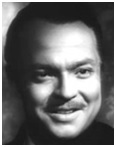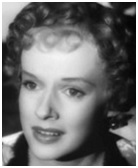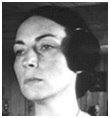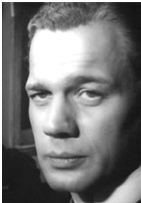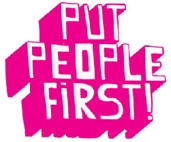|
 |
|
 |
|
|
||
Citizen Kane - Leadership and Ethics
Citizen Kane (1941)
Famous for...
Director Orson Welles (aged only 25!)
Oscars One (best original screenplay). Key characters Charles Foster Kane (Orson Welles), newspaper proprietor - pictured right.
The story In 1941 the rich and powerful newspaper tycoon, Charles Foster Kane’s last dying word
is “Rosebud”, holding a snow globe. Flashbacks show highlights from his past:
For an obituary newsreel Jerry Thompson, a reporter, investigates Kane’s life which is revealed through interviews with his friends and associates. Thompson approaches Kane’s second wife, Susan Alexander, who tells him nothing, but later in a second interview
says much more. He discovers that Kane’s parents reluctantly agreed for him to be brought up by an unloving
banker, Mr. Thatcher, after he inherited a huge fortune (sixty million dollars). The day (aged eight) he was taken away from his home and his mother (pictured right), he was playing on a little sled (or sledge). Thompson finds out more about him from his:
After buying the Inquirer Kane boosts its circulation by:
Kane sacks Jedediah Leland (pictured right) after he gives an honest assessment of Susan’s horrible opening night performance as an opera singer. She eventually leaves him and, while angrily destroying her room, Kane finds a snow globe with falling snowflakes, This reminds him of the snowy day he said goodbye to his mother, when he was playing on a sled with the name Rosebud on it. So he dies, holding the globe and saying; “Rosebud!” He dies a lonely old man, locked inside Xanadu, his luxury mansion. The film ends after his death with smoke rising out of Xanadu from the burning of Kane’s possessions including his treasured sled.
Lessons for leadership and ethics 1. People count not possessions His mother’s rejection made Kane unable to have close relationships. His obsessive spending and collecting (particularly statues) can’t fill this void, and he dies a miserable, lonely old man. He desperately wants his mother, not his huge inheritance. His son and ex-wife also die in a car accident in 1918.
2. Power corrupts He uses power for his own advantage (like using his newspaper to support his political campaign) even at the expense of his friends, wives and employees. “I’ll provide the war”, he tells his reporter who says there is no war in Cuba. Kane’s best friend. Jedediah Leland (pictured right), says he was a”swine” and “did brutal things”.
3. Integrity is inspirational Kane fails to inspire people’s love and loyalty, because of his bad character. He is unprincipled, ruthlessly imposing his will on others like his:
Kane forced her to be a singer and was totally self-centred. To win the governor's election (pictured right), he is even prepared to sacrifice his son's feelings by publicizing his affair with Susan. 4. Practise your principles When Kane buys The Inquirer, he gives the newspaper the principles of journalistic honesty and integrity which he immediately breaks, much to Leland’s disgust. Leland says that Kane believed in and loved nothing but himself. Kane tells his first wife, Emily, that people will think “what I tell them to think”. Kane:
5. Remember your legacy Kane was a failure, because he wanted to be remembered as a happy, loving human being (as he was with his mother), not a ruthless businessman. The burning of his sled (sledge) and other possessions after his death shows how quickly his power and money were forgotten.
6. Selfishness stinks Kane’s self-centredness ruins his relationships including his:
Kane dies alone and miserable. His second wife, Susan, says about him; “You never give me anything I really care about”.
Key quotes on happiness and success “Rosebud!”, Kane’s last dying word. Mr. Kane was a man who got everything he wanted and then lost it...Rosebud is just a piece in a jigsaw puzzle, a missing piece, Thompson. Mr. Kane was a man who lost almost everything he had, Bernstein.
Key quote on business ethics They’re going to get the truth in The Inquirer – quickly and simply and entertainingly, Kane’s declaration of The Inquirer’s principles.
Key quote on leadership and management I don’t know how to run a newspaper...I just try everything I can think of, Kane. There's only one person in the world who decides what I'm gonna do and that's me, Kane.
Key quote on age Old age, it's the only disease...that you don't look forward to being cured of, Bernstein.
Key quote on the past That's one of the greatest curses ever inflicted on the human race, memory, Leland.
Two film websites to recommend 1. filmsite.org (run by Tim Dirks). 2. aveleyman.com (run by Tony Sullivan) |
|
|
||
|
|
||
| Copyright © wisdomtowin.com 2025 All Rights Reserved | ||
|




